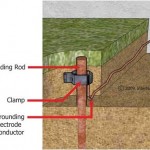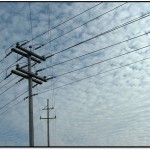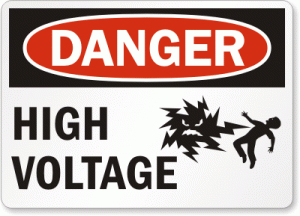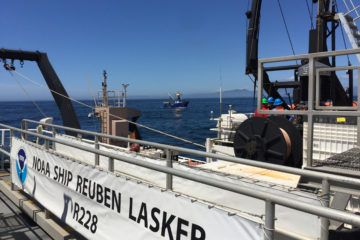Ocean Companies Safety Tip of the Week – Electrical Safety
ELECTRICAL SAFETY
As I sit at my desk I notice that I have five things plugged into outlets at my desk. There’s the computer, the monitor, the phone, an extra light, and of course my speakers. In today’s society it would be virtually impossible to run a large business without electricity. Out on the processing lines we have some electric forklifts, weigh scales and our maintenance department has a large variety of power tools.
At home, I have my blender for my daily protein drink, the fridge, stove, washer, dryer, and etc. I know I could live without electricity, because I am of an age I remember mom and grandma cooking on the wood cook stove, but it would not be my first choice.
Electricity needs to be respected, not just for what it can do for you, but by what it can do to you! I know many people out there have suffered from a zap of static electricity. A sharp pain followed by a tingling feeling is generally what is felt when that happens. But electricity can cause painful burns, or even death, if not used correctly and taking lifesaving precautions. The following table shows how many amps it takes for different effects of electricity.
Water and electricity are a deadly combination! Never use an electrical appliance, power tool or machinery if it is wet, near a pool or any other wet area, or in the rain. This includes not using an electric lawn mower or weed-eater if the grass is wet. Never leave extension cords lying in water. If you must use an electrical device in an overly moist area, make sure the outlets and/or power cords are equipped with a GFI (Ground Fault Interrupter) system, are rated for outdoor use and are rated for your power needs.
Unplug for safety! Make sure you unplug appliances or machinery before you inspect, clean, repair, store or if you are removing something from them. When not in use, small appliances and power tools should be unplugged and stored in a dry area.
Inspect your tools! First remember to unplug, and then check all cords and plugs to make sure there are no frays, cracks, or breaks. If the housing on the plug or the casing on the cord shows any kind of damage, stop using it and either have it repaired or replace it immediately. If you’re at work, place a tag on the item that says, “DO NOT USE”, and write why it is taken out of service (this is also a good idea to do at home, so it is not accidentally used causing an injury), and report it to your supervisor.
 Stay Grounded! A three pronged plug should never have the ground pin (commonly referred to as the third prong) removed in any way. If you notice upon your inspection one has been removed, tag it out and DO NOT USE IT! All electrical equipment needs to be grounded. Plug power tools into grounded outlets installed with a GFI (Ground Fault Interrupter) system, or extension cords equipped with inline GFIs.
Stay Grounded! A three pronged plug should never have the ground pin (commonly referred to as the third prong) removed in any way. If you notice upon your inspection one has been removed, tag it out and DO NOT USE IT! All electrical equipment needs to be grounded. Plug power tools into grounded outlets installed with a GFI (Ground Fault Interrupter) system, or extension cords equipped with inline GFIs.
 Look up! Before you fly that kite or model airplane, install that antenna, or slap that extension ladder onto the house, look up. Check for overhead power lines. How close are they? Kites or model airplanes should be flown in open areas well away from trees and power lines, and kites should never be made of metallic materials. Antenna should be installed following the manufacturer’s instructions, just remember to keep yourself, your tools and materials, and/or equipment no closer than 10 feet from any power lines. When you’re carrying a ladder, especially if it is a metal ladder, carry it parallel to the ground, not up in the air. Look at the area you are going to place the ladder and keep it at least 10 feet away from any power lines. If you are going to trim trees, remember, electricity is attracted to moisture and metal. Even if you are using a wooden ladder, it can get wet and you may still be at risk for electrocution. Likewise, if you are pruning a tree while standing on the ground and the branch is wet, if it hits a power line, the electricity can travel through the limb and the pruning tool and finally through you!
Look up! Before you fly that kite or model airplane, install that antenna, or slap that extension ladder onto the house, look up. Check for overhead power lines. How close are they? Kites or model airplanes should be flown in open areas well away from trees and power lines, and kites should never be made of metallic materials. Antenna should be installed following the manufacturer’s instructions, just remember to keep yourself, your tools and materials, and/or equipment no closer than 10 feet from any power lines. When you’re carrying a ladder, especially if it is a metal ladder, carry it parallel to the ground, not up in the air. Look at the area you are going to place the ladder and keep it at least 10 feet away from any power lines. If you are going to trim trees, remember, electricity is attracted to moisture and metal. Even if you are using a wooden ladder, it can get wet and you may still be at risk for electrocution. Likewise, if you are pruning a tree while standing on the ground and the branch is wet, if it hits a power line, the electricity can travel through the limb and the pruning tool and finally through you!
Know where the power comes from! Keep track of where the fuses boxes, circuit breaker panels, or junction boxes are, especially for the equipment you are using.
Keep it clean! Keep electrical equipment, machinery, and work areas clean. Oil, dust, waste, and water can be fire hazards around electricity. It is important to keep flammable materials away from electric heat sources and lights and to keep access to circuit breaker panels, fuse boxes and junction boxes clear in case the power needs to be shut off in a hurry.
Check the heat! If the outlet or cord are overly warm, tag them out and don’t use them! If it is the outlet that is too warm, it may be a sign of unsafe wiring. Unplug any cords to the outlet, tape a “DO NOT USE” tag near the outlet and report it to someone who can safely follow-up on it. If it is the cord, it may not be rated for the amount of power the equipment draws and you may have to find one rated for what you need.
 Do not Enter! If you are not trained to work in high-voltage areas, do not enter, even in an emergency. If there are downed power lines, stay at least 35 feet from the area, try to keep all but emergency personnel from entering, as well.
Do not Enter! If you are not trained to work in high-voltage areas, do not enter, even in an emergency. If there are downed power lines, stay at least 35 feet from the area, try to keep all but emergency personnel from entering, as well.
Call before you dig, or build! If you are planning an outdoor project where you will have to dig, make the free call to the Utility Notification Center 811 or 1-800-424-5555. They will tell you if there are any underground utilities you need to be aware of. Never plant or construct a permanent structure directly in front of underground electrical equipment devices.
In case of electrical fire! Do not use water! If it is a small fire, use an extinguisher that has a “C” on it, the most commonly found are “ABC” extinguishers or CO2 extinguishers. If it is not small, get out of there and call 911 and let the professionals handle it!
Respect electricity, even low voltage electric lines and cords can be hazardous if not handled correctly, or if there is damage. Follow safe work practices, if not for yourself, for your family and co-workers. Accidents affect us all.
Sources: Safety X change, Washington Department of Labor and Industries, APS – Arizona Public Service Co.
– Cherie



